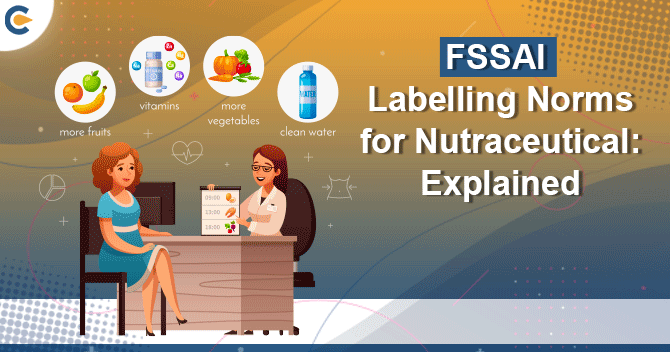The latest Research and studies imply end-users increased focus on fitness and health care. This concern among the general public has led to an increased demand for nutraceuticals, particularly among millennials. While leveraging this situation, various brands and pharma entities identify the potential and vent into the nutraceuticals’ market. The continual growth of the nutraceutical sectors has been seen in our country, and this industry is projected to grow up to 18 billion in 2025.
What Do You Mean by the Term “Nutraceuticals”?
Nutraceuticals or functional foods refer to food that facilitates health benefits to minimize the risk of chronic diseases and fundamental nutrition. Nutraceuticals are typical examples of dietary supplements, natural foods, citrus fruits, fortified dairy products, minerals, milk, and cereals.
Labelling Provisions for Nutraceuticals under FSSAI
The Food Safety and Standards (Health Supplements, Nutraceutical, food for special dietary use, food for special medical purpose, functional food, and novel food) regulations, 2016 facilitates the given the labelling provisions for nutraceuticals;
(i) The labelling on the nutraceutical-based food items shall not claim that the packed food items offer medicinal benefits or treat any chronic disease.
(ii) The statement by the manufacturer related to the function or structure or the general well-being of the body may be permitted by the FSSAI if the legit scientific data support the statement;
(iii) Every package of nutraceutical-based food shall enclose the given details on the label, namely:
- the word “NUTRACEUTICAL”;
- the common name of the nutraceutical;
- A declaration pertaining to the amount of each nutraceutical ingredient available in the product that either has a physiological or nutritional effect;
- Where it is necessary, the nutrient’s quantity shall be reflected in terms of % of the relevant advisable daily allowances as recommended by the Indian Council of Medical Research[1] even when the nutrient is a mere addition to the nutraceutical and shall have an advisory warning – ‘not to exceed the stated recommended daily usage’;
- an advisory warning stating- ‘recommended usage
- an advisory warning ‘ stating ‘NOT FOR MEDICINAL USE.’
- an advisory warning in cases where excess consumption could be fatal for the end-users;
- Precautions to be taken during consumption
- Known side-effects, if any.
- Product-drug interactions, as applicable;
- A statement reflecting that the product should not be placed near children;
(5) No FBO shall utilize additives for nutraceutical formulation except those cited in Schedule VA or Schedule VE or Schedule VF.
Significance of labelling provisions from the consumer’s viewpoint
India’s nutraceutical market is set to become a world leader at USD 4-5 billion. Some reports suggested that this market will thrive up to USD 18 billion by 2025. The production rate of dietary supplements has been skyrocketed, especially after the Covid-19 era. The nutraceutical sector is a profit churning market that might attract some malpractices who might adopt unfair practices such as adulteration to earn extra money. This not only endangers the consumers’ life but also pose a risk to the credibility of those serving the supply chain. To mitigate such a risk, FSSAI has rolled out the aforementioned labelling provisions, which enable the end-users to make an informed decision regarding their purchase.
The labelling provisions aim at;
- Mitigating malpractices such as adulteration or excessive use of ingredients
- Rendering clarity to the end-users regarding the product’s content
- Compelling manufacturers to produce quality products and maintain transparency
The labels being the primary link of communication between producers and end-users, these norms overall could be termed as customer’s friendly and aimed at rendering complete detail to the end-users to make healthy choices. Labelling regulations mandate manufacturers to adapt their business model in view of these guidelines.
Conclusion
The FSSAI provisions facilitate strict compliances relating to labelling declarations. Hence, it is vital to get accustomed to its regulatory requirements and comprehend the legalities of what is displayed on the label. Breaching such regulations would invoke serious consequences for the manufacturers. Thus, it is wise to follow these compliances as it is beneficial for manufacturers as well as end-users.
Read our Article:Latest Food Fortification Regulations in India













